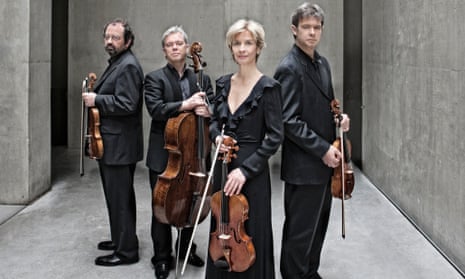Mozart’s string quartets are core chamber music repertoire. That much is beyond question. But a concentrated series of concerts exclusively devoted to Mozart quartets, an approach familiar with the quartets of Beethoven, Schubert or Bartók – that’s a bit unusual. Does this relatively rare opportunity suggest a slight modern tendency to take this music for granted?
If so, a series of Mozart concerts by the Hagen Quartet at the Wigmore Hall provides the best and most robust answer. Their four concerts this week span the whole of Mozart’s mature quartet output after his move to Vienna, played in strict publication order. If that is not tempting enough, then the sparkling spontaneity of the way the Hagens approach works they have played many times over the years ought to be the clincher.
The first concert opened with the first three of the six quartets dedicated to Haydn, in G major K387. As with the works that followed, the Hagen Quartet played throughout with an exhilarating immediacy. First violin Lukas Hagen led from the front, always unafraid to explore the tonal and dynamic boundaries of Mozart’s writing. The whole quartet captured the tenderness of the slow movement and the rich contrapuntal textures of the finale with great mastery. There was not a bar that felt like academic ensemble playing.
The D minor quartet K421 followed, a greater work and even more persuasive in the Hagens’ highly expressive approach, which ideally suits the yearning quality of the opening movement. Again, though, there was terrific care and intellectual intensity in the way the quartet captured the fast-changing moods and harmonic changes of the variations finale.
There were moments in the E flat major quartet K428, which closed the recital, when the Hagens pushed Mozart’s harmonic possibilities a little too close to the edge. But these quartets can take it. They are pieces that massively reward the questing approach that is such a Hagen characteristic.

Comments (…)
Sign in or create your Guardian account to join the discussion